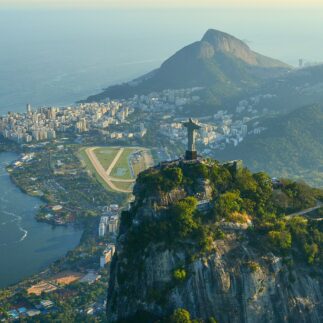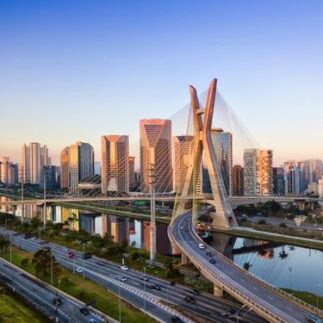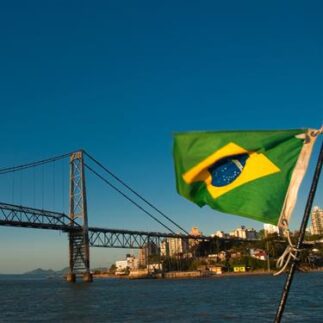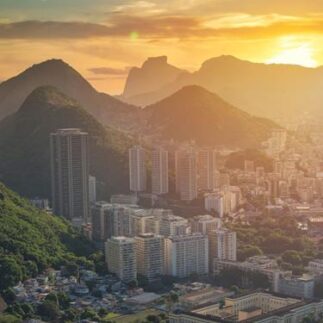Overview
Brazil Online Gaming Overview
Partially Regulated
The Federal Constitution of the Federative Republic of Brazil (“Brazilian Federal Constitution”) embodies the principle of free enterprise as one of its fundamental principles, which is also stated as a general principle of the economic activity as the basis of the economic order, together with free competition.
In addition, the Brazilian Federal Constitution embraces the legality principle, whereby “no one shall be compelled to do or refrain from doing anything unless by virtue of the law”, which means that whatever is not expressively forbidden by law is permitted to be done by individuals and private companies.
It follows from such principles that any lawful economic activities can be conducted in Brazil, unless expressively forbidden by the law or expressively conditioned to satisfying certain legal requirements or complying with regulations laid down by competent governmental authorities.
When it comes to gaming and betting, the first and main issue to be tackled is whether games of chance and skill are lawful or not, since games of skill and games of chance are treated differently in Brazil.
It also follows from the above that the deciding factor in ascertaining whether a game is considered a game of chance in Brazil, whether land-based or online, is the extent to which winning or losing depends on luck or skill. Whenever the outcome depends predominantly on skill (even if luck is a factor in the result), the game will not be considered a game of chance and, hence, will not be subject to the restrictions of the Criminal Contraventions Law. Therefore, although most games of skill are not currently subject to specific legislation, and, thus, are not subject to licensing, they are, in principle, lawful under Brazilian law.
On the contrary, games of chance are defined by article 50 of the Criminal Contraventions Law of 1941 (as subsequently amended) as games in which luck has an exclusive or preponderant influence on the outcome of the game. The establishment or exploitation of such games of chance in a public place, or one accessible to the public, with or without payment of an entrance ticket, is considered a criminal contravention (misdemeanour).
Until very recently, games of chance (where winning or losing depend predominantly or exclusively on luck) were prohibited in the Brazilian territory (and some still are) under the above mentioned Criminal Contraventions Law (Federal Decree-Law No. 3,688/1941, as subsequently amended). In 2018 fixed odds sports betting became legal (as a form of Lottery) with the enactment of Law No. 13,756/2018. Since then, even while awaiting regulation on fixed odds sports betting, in practice Law No. 13,756/2018 lifted the prohibition and enabled offshore operators licensed abroad to widely publicize in Brazil fixed odds sports betting offerings through several channels (including sponsoring Brazilian sporting teams), which their gaming website also providing other online gaming verticals to the Brazilian market.
In addition, in a judicial proceeding which we have had access to, the Brazilian Federal Police issued an opinion regarding the relationship established between a foreign online games of chance operator (bet9) and Brazilian customers, stating that since its website was not hosted in Brazil the Criminal Contraventions Law would not apply extraterritorially, given that Article 2 thereof determines that it is applicable only to wrongdoings perpetrated in Brazil and further concluded that Brazilian costumers accessing gaming and lottery websites hosted outside the Brazilian territory should not be prosecuted under the Criminal Contraventions Law.
In light of such precedent, in the past 5 (five) years, the Grey Market has attracted hundreds of online gaming providers which have enjoyed a great deal of leniency from Brazilian law makers on voting several legislative proposals for regulating the matter.
It follows from the above, the Brazilian games of chance market has been divided as follows:
White Market (legalised/regulated):
- State-run lotteries (at federal, state and municipal levels)
- Lotex: instant scratch-card lottery
- Betting on horseraces in authorized racetracks
- Fixed-odds sports-betting, at federal, state and municipal levels
Grey Market (there being legal arguments for and against the legality):
- Online provision of games of chance by offshore operators (fixed odds sports betting and online gaming being excluded from this category since such vertical is now included in the White Market)
Black Market (illegal):
- Land-based games of chance
- Online games of chance by local operators in the Brazilian territory
On 29th December 2023, President Lula enacted Law No. 14,790/2023 further regulated only fixed odds sports betting operations in Brazil and also legalized online gaming at federal level. Pursuant to Law No. 14,790/2023, online and land based fixed odd sports betting and a variety of online games of chance may be operated in Brazil upon federal licenses being made available by the Ministry of Finance.
Law No. 14,790/2023 considers the following vehicles to be lawful under the fixed odds lottery:
- Real-themed sports events that cannot exclusively involve minors, in which the outcome of the same is unknown at the time the bet is placed and which are conducted in accordance with the rules established by the national sporting organisation under the Brazilian General Sports Law, or affiliated entities, or by sports administration organisations headquartered overseas
- Virtual online gaming events, where online gaming is defined as the electronic channel making available virtual bets on games in relation to which the result is unknown at the time the bet is placed and is determined by the outcome of a future aleatory event, using a random generator of numbers, symbols, figures or objects defined in the rules system
To the extent the definition provided for online gaming is quite broad, practically any online game in which the bettor knows (based on the fixed odds) what the return on the bet will be at the time it is placed (whether before or during the event) will be lawful. The Ministry of Finance along with the Ministry of Sports are to further regulate which online games fall within the above-mentioned scope.
For the time being, online and land based fixed odd betting and a variety of online games of chance may be operated in Brazil upon Federal licenses being issued by the Ministry of Finance. Some Brazilian States have also made available state licenses for traditional lottery products and fixed odds sports betting and online gaming, as we will address later
Law No. 14,790/2023 also refers to fantasy sports as being a game of skills and confirms that a license is not required to exploit such vertical.
Although in the process of being fully regulated, the requirements already established by Laws No. 13,756/2018 and 14,790/2023 are as follows:
- The operator seeking a license must be (s) or controlling shareholder of the operator, may not hold shares in football corporations or professional sports organisations, nor act as a manager of a Brazilian sports team
- The operator must integrate or be associated with national or international sports integrity monitoring organisations
- The operator must satisfy requirements for holding and exercising executive and managerial positions in the interested corporate entities, and, also, must appoint an officer responsible for the relationship with the Ministry of Finance
- Operators must structure a customer support service and ombudsman, and also appoint an officer responsible for customer support service and ombudsman position
- The information technology infrastructure and the operators’ systems must be aligned with the technical and cybersecurity requirements recognized nationally or internationally (including GLI-33 certification and the use of gambling management tools
- Operators must implement internal policies, procedures and controls pertaining to:
- The prevention of money laundering and the financing terrorism and the proliferation of weapons of mass destruction
- Internal policies for responsible gaming and the prevention of pathological gaming disorders
- Betting integrity and prevention of match-fixing and other related types of fraud
- Operators can only make use of services by PSPS authorized by the Brazilian Central Bank to use transactional accounts
- The operator shall adopt identification procedures to verify the accuracy of the bettors’ identity, including the use of identification and facial recognition technology
- The operator shall keep a record of all transactions conducted, including bets placed, winnings, withdrawals and deposits in transactional accounts regulated by a Normative Ordinance)
- The operator must prove knowledge and experience in gaming, betting or lotteries by at least one of the members of the controlling group of the interested corporate entity
- In order to obtain their federal operating License, the operator will have to pay a one-time fee of BRL 30 million for the Federal Government
- Once Federal Licenses have been made available, only licensed operators will be permitted to continue to advertise nationwide. Advertisements shall include notices discouraging gaming and warnings about health problems triggered by the same, besides observing applicable restrictions regarding times and marketing channels with a view to only targeting adults
- The law also encourages autoregulation, which is why the industry has been in close contact with CONAR – the Brazilian non-governmental organisation that self-regulates the advertising sector
- The law also provides authority to the Ministry of Finance to notify companies publicizing advertisements violating the provisions of the law for them to exclude them. Judicial intervention will be required if such companies fail to exclude such unlawful advertising, which can include the blocking of websites as has been seen in 2023
Unlicensed operators will be considered as operating in the black market as from 1st January 2025. Applicants filing within 90 days counted as from 22nd May 2024, will have their licenses issued (if they do not encounter any incidents or demands for additional information/documentation) by 31st December 2024.
Besides the federal licensing process, which is now underway, under the current legal framework, Brazilian States and Municipalities are also allowed to operate lotteries (which would include the fixed odds lottery). This is because in November 2020 the Brazilian Federal Supreme Court (“STF”) determined the end of the Federal Union’s monopoly on the exploitation of lottery and following such decision many Brazilian States and Municipalities have launched their own lotteries and tenders for accreditation of operators.
It is important to note that the Law confirmed that while certain of its tax-related provisions are also applicable to fantasy sports, the exploitation of this (skill) gaming vertical (which for the first time in Brazil was adequately defined by law) would remain otherwise unregulated and not require a license (and may distribute cash prizes).
Finally, it is important to remember that the legal framework for games of chance in Brazil will only be complete when (and if) Bill of Law No. 442/1991, approved by the Chamber of Deputies in February 2022 and renumbered Bill of Law No. 2,234/2022 after reaching the Senate, which seeks to legalise land-based casinos and bingo parlors, as well as jogo do bicho, is enacted as a federal law. It was to be voted on by the Senate on 20th December 2023, but the session was cancelled, pushing the vote into 2024. Recently this Bill of Law was approved by the Senate´s Constitution and Justice Comission (CCJ) and may be voted by the Plenary in the second half of 2024.
The enactment of Law No. 14,790/2023 has certainly served as a catalyst for moving this process forward after the Congressional Recess of July 2024. President Lula has signalized that he is inclined to sanction the bill of law if it passes in Congress.
However, recent developments, including a few scandals involving fraudulent companies and influencers and the fear of over-indebtedness by lower-class bettors by governmental bodies started tarnishing the reputation of fixed odd betting in Brazil. President Lula declared that a proposal to effectively regulate online betting platforms should be ready by the end of 2024 and that if the new rules did not bring beneficial results in terms of preventing gambling addiction and the loss of money for families, the government will put an end to the betting industry.
This has also impacted the voting of Bill of Law No. 2,234/2022. At the end of October, Senator Irajá Silvestre, the Bill’s rapporteur said at an event in São Paulo that the vote on the Bill at the Senate has been postponed until the political environment is more favorable.
In turn, as will be explored in more detail below, the applications for the federal license have been moving at rapid speed. Almost 300 (three hundred) companies are currently participating in the licensing process and up to 113 (one hundred and thirteen) applicants that filed their applications by 20th August 2024 expect to have their licenses issued by the end of 2024.
Market Size
Brazil has often been described as a sleeping giant with no formal regulation, but under Federal Law No. 14,790/2023, published on 30th December 2023, regulating both online games of chance and land based and online fixed odds sports betting, the giant has been awakened.
During 2023, Ministry of Finance anticipated the general principles to be applied to the new regulated market by issuing Normative Ordinance No. 1330/2023 whereby among other matters, invited any interested companies, including those operating offshore, to express their interest in applying for a licence in Brazil.
Within a window of 30 days, in November 2023, 134 (one hundred and thirty-four) companies manifested their interest which can be interpreted as a sign of the huge demand for operation and regulation on the Brazilian Market on Federal level.
Ever since the federal licensing process began, in May 2024, almost 300 (three hundred) operators have applied for a federal license, representing over 800 (eight hundred) brands to operate in Brazil at a federal level, proving even further that Brazil has a huge demand for operators in the regulated market.
Competitive Landscape
See general overview section above.
Localisation
See general overview section above.
Top Key Attractions and Challenges
Attractions
The most relevant attraction for offshore operators is the new legal framework itself. Now that the market is being regulated, companies that were uncertain on operating under an unregulated market may feel more confident in operating in Brazil, since they can conduct their activities with full legal backing. The previous lack of regulation, which lead to the growth of the grey market and scared off foreign operators to bring their business to the Brazilian market, is now a thing of the past and the legal support now serves as a safety net for those companies.
Another point of interest is the the reduction of the GGR tax to 12% at federal level.
Operators also are seeing the federal enforcement against unlicensed operators that are not participating in any licensing processes (federal or state), guaranteeing the exploitation of the business only to the regulated operators.
Challenges
Law No. 14,790/2023 requires that companies applying for a federal license must be incorporated under Brazilian law and have their registered offices in Brazil, as well as a minimum Brazilian share capital ownership of 20%. The law, however, is not precise as to what “Brazilian” entails, whether indeed a Brazilian national (individual) or a Brazilian corporate entity (i.e. one incorporated under Brazilian law and having its registered offices in Brazil). The Ministry of Finance through its Prizes and Betting Secretariat (SPA) recently clarified that the Brazilian shareholder holding the minimum 20% ownership can be either a Brazilian individual or corporate entity. This means that foreign operators need to establish a local two-tier corporate structure, whereby firs a local holding company is incorporated (held 100% by the foreign shareholder) and such company, which will be considered a Brazilian company, will incorporate a wholly owned subsidiary to act as the local operator applying for the Federal license. in the local company applying for the licence).
The licensing fee of BRL30 million (approx. USD6 million), even though it serves a five-year term and a nationwide validity for up to three different brands of the same company, can be considered a much higher amount that other fees found internationally. The magnitude of the Brazilian market and its potential could be attributed as one of the causes that lead the Ministry of Finance to stipulate that fee.
Even though the license fee seems initially high, it is important to mention that that amount will be applicable to up to 3 (three) brands of the same operator. And each brand can operate as many products, including all kinds of games of chance, as it wants. In that sense, the fee’s value could be diluted in a myriad of different products.
Products
Licensing & Regulation
Brazil Online Gaming Licensing & Regulation
During 2024, the Ministry of Finance has been taking several measures to regulate Law No. 14,790/2023 and make licenses available. Its Prizes and Betting Secretariat (SPA), among other initiatives, has already issued several Normative Ordinances, most of them indicted on Normative Ordinance No. 561/2024, which sets out the regulatory policy timeline:
Normative Ordinance 300/2024 – regulates the requirements and procedures...Unlock Your Free Trial
Sign up for your 7-day free trial and get access to regulatory intelligence today.
Products
Enforcement
Brazil Online Gaming Enforcement
Regulating Bodies
At federal level, the regulator ensuring compliance with Law No. 14,790/23 is the Ministry of Finance jointly with the Ministry of Sports. The SPA was created within the Ministry of Finance, and is responsible, among other things, for regulating, authorising, standardising and supervising the segments of free distribution of prizes as advertising, early collection of popular savings,...
Unlock Your Free Trial
Sign up for your 7-day free trial and get access to regulatory intelligence today.
Products
Marketing
Brazil Online Gaming Marketing
Offline:
Radio & TV Broadcast, Print, SMS, Sponsorship
Once federal licenses have been made available, only licensed operators will be permitted to continue to advertise nationwide. Advertisements should include notices discouraging gaming and warnings about health problems triggered by the same, besides observing applicable restrictions regarding times and marketing channels with a view to only targeting adults. The...
Unlock Your Free Trial
Sign up for your 7-day free trial and get access to regulatory intelligence today.
Products
Fees
Brazil Online Gaming Fees
Application Fees
At Federal level the licence fee is BRL30 million covering up to 3 brands and including all kinds of sports betting and online gaming products for a period of 5 years.
Ongoing Fees
There is a monthly inspection fee due based on monthly GGR ranging from BRL54,419.56 to BRL1,944,000.00. See table below:
Unlock Your Free Trial
Sign up for your 7-day free trial and get access to regulatory intelligence today.
Taxes
Brazil Online Gaming Taxes
Please note that in addition to GGR tax, which at Federal level is 12%, and the monthly inspection fee, operators will be taxed by corporate income tax, social contribution on net profits, PIS, COFINS, and municipal service tax, which ranges from 2% to 5%, depending on the municipality.
Licence Taxes
N/A
GGR Tax
Under Federal Law No. 14,790/2023, once it...
Unlock Your Free Trial
Sign up for your 7-day free trial and get access to regulatory intelligence today.
Future Outlook
Brazil Online Gaming Future Outlook
This year has certainly been a busy year for all operators of the newly regulated market. The Ministry of Finance started 2024 within the initial testing phase of the systems it has already developed with the group of 134 operators, as well as creating the Prizes and Betting Secretariat (SPA).
The SPA has released several Ordinances to regulate the gaming...
Unlock Your Free Trial
Sign up for your 7-day free trial and get access to regulatory intelligence today.
Products
Unlock Your Free Trial
Sign up for your 7-day free trial and get access to regulatory intelligence today.
Legal Expert
Montgomery & Associados
Montgomery & Associados is a Brazilian law firm with a dedicated Minds Sports, Draws, Gaming, Betting and Lottery Practice Group. It pioneers the innovative business model of Lean Full Service – LFS® and is the only Brazilian full-service law firm with a dedicated team specializing in gaming and betting. Neil Montgomery, founding and managing partner and practice group head represents Brazil as a General Member at IMGL, is a published author and a regular speaker at international gaming and betting events. He has worked as a lawyer in London and São Paulo and specializes in advising multinational companies in investing and doing business in Brazil and Brazilian companies expanding their businesses overseas.
Sorry. You must be logged in to view this form.





